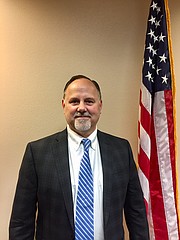Don't give up elected positions, speakers say
During their interviews with study commissioners Wednesday night, two speakers stressed that the loss of elected officials would erode accountability.
The Optional Forms of Government Study Commission is tasked with researching if the current Kootenai County structure - three commissioners and six other elected officials - best serves constituents. Through a series of ongoing interviews and data collection, the group will evaluate if there's any value in switching to a new form of government. If so, that proposal will go to county voters.
Before retiring as sheriff last December, Ben Wolfinger dedicated nearly four decades to the Kootenai County Sheriff's Office. During that time, Wolfinger said he watched the Idaho Legislature "struggle" to develop the code that permits alternative forms of county government.
All Idaho counties now operate under the three-member, full-time board of commissioners and six elected officers. Wolfinger attributes the dominance and success of that structure to the built-in checks and balances defined by the U.S. and state constitutions.
Wolfinger said he acted as a "check" and "balance" when he was sheriff. Those checks were often on county commissioners, whom Wolfinger said he did not answer to but collaborated with.
"I told more than one county commissioner that they were outside their scope of authority," Wolfinger said. "That is not to say that we didn't try to work together to reach common goals, but they were not my boss."
Under I.C. 31-5001, the OFGSC is permitted to recommend that the six non-commissioner elected officials — Sheriff, Assessor, Treasurer, Clerk, Coroner, and Prosecuting Attorney — become hired positions. That change, Assessor Bela Kovacs said, would severely diminish the offices' accountability to citizens.
"Appointed departments are not directly answerable to the people but only answerable to their employer," Kovacs said Wednesday night. "Converting the elected officials to appointed positions will only serve to empower, insulate and shield the commissioners at the loss of a representative and participatory form of government."
Kovacs opened his comments relating the stories of his father. Kovacs said his father escaped communist leadership in Hungary following World War II and the later Hungarian Revolution. Hearing his father's experiences shaped Kovacs' beliefs, he said, and highlighted "how bad things can get when the structures of society crumble."
"I urge you to consider the sincerity of my intention aimed at preserving the hard-fought-for elements of participatory government," Kovacs said, "a product born out of revolution and the strong yearning by the American people to be self-governing."
Kovacs said any significant change to government structure could have detrimental effects in the immediate future or long term.
"Given the scope and the magnitude of the issues the (assessor's) department is facing, I firmly believe that such a change would be devastating to the operations of this office," Kovacs said. "I just think it would be catastrophic."
Both Wolfinger and Kovacs emphasized the importance of maintaining checks and balances through elected officials.
"A hired person removes the checks and balances that the Idaho Constitution originally set in motion for county governments," Wolfinger said. "That person is a lot less likely to tell their boss 'no' when it needs to be said than an elected person who is an autonomous position by the people."
Another alternative available to study commissioners is to increase the number of county commissioners and make them part-time officials instead of full-time. Kovacs said either switch would be a disservice to citizens by being more costly and risking backroom deliberations.
"It would not be in the best interest of the public to have commissioners who are part-time with interests that lie elsewhere," Kovacs said. "The public deserves better than mediocre and part-time performance."
Despite the lack of specific statutory qualifications to run for office, Wolfinger said it's the responsibility of voters to vet elected officials.
"The gentlemen who framed our original state constitution left it to the voters to decide who is best qualified," Wolfinger said. "If those officials are not doing their job correctly, the people will fire them by not voting for them."
Of all alternatives available in Idaho Code, Wolfinger favored only the possibility of adding an administrator position to provide consistency and facilitate day-to-day operations.
"Since many boards turn over one or two people every two years, there is a renewed learning curve that is not an efficient way to run a government," Wolfinger said. "Mistakes are repeated, and no one carries the corporate history to avoid the pitfalls of yesteryear."
Lapses in institutional understanding have led many previous study interviewees to make "false comparisons" that "counties should be more like private-sector corporations," Kovacs said. However, Kovacs compared corporations to an oligarchical (small group in control) style of leadership that would inhibit voter representation.
"Local government was not intended by the forefathers to be oligarchical in form. Government under the American way is necessarily deliberative in its processes," he said. "It has to be accountable to the people and allow the voices of the few to be heard."



